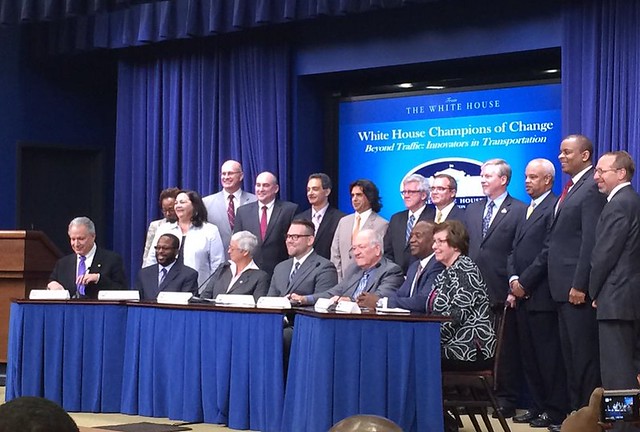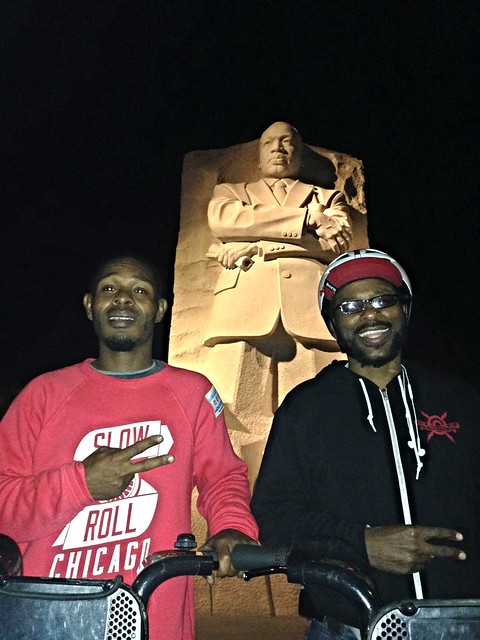On Tuesday, one of Chicago’s leaders in the fight for transportation equity was recognized on a national level. Slow Roll Chicago cofounder Oboi Reed was one of 11 transportation innovators who received the 2015 White House Transportation Champions of Change awards.
SLC has tirelessly advocated for cycling as a means to improve health outcomes, transportation access, and economic development in low-to-moderate-income communities on the South and West Sides. The group has called for a more equitable distribution of bike resources, which seems to be having an influence on the city government.
The Chicago Department of Transportation recently announced that they’re doing more community outreach in underserved areas to determine where new bike lanes should go. They’ve also contracted Slow Roll to publicize the Divvy for Everyone equity program.
350 transportation leaders were nominated for the Champions of Change awards. “It means a lot to me that the White House and the U.S. Department of Transportation thought highly enough of our organization to select me for the award over all the other candidates,” Reed said. “It’s a confirmation that Slow Roll is moving in the right direction with programs like our weekly Signature Ride series.”
Earlier this year, the U.S. DOT released a draft report, "Beyond Traffic," which found that congestion will be a growing problem across the nation over the next 30 years unless changes are made to our transportation system in the near future. The Champions of Change awards honored people from around the country who are working to meet this challenge head-on.
The roster includes everyone from bridge engineers, to an airport CEO, to a transit authority chief, to an expert on improving travel safety for children with special needs. The group also features longtime Seattle bike-ped coordinator Peter Lagerway, who is credited with helping to promote the concept of the four-to-three conversion road diet. That strategy that has transformed Chicago Streets like Lawrence Avenue and 55th Street.
Prior to the awards ceremony on Tuesday, Reed gave a presentation about Slow Roll as part of a USDOT “webinar” presentation challenging cities to step up their game on traffic safety. Also participating was fellow awardee Kyle Wagenschutz, bicycle-pedestrian manager for Memphis, Tennessee, an up-and-coming cycling city.
Afterwards, the 11 Champions of Change met with U.S. Transportation Secretary Anthony Foxx. During the awards ceremony, the honorees gave two panel discussions in which they discussed their work. Later, they got a tour of the White House.
Reed, who traveled to D.C. with his parents and SLC cofounder Jamal Julien, a childhood friend, stayed in the city for a few days before traveling to Charlotte for the North Carolina Bike Summit. During his time in the nation’s capital, he met with Chris Bryant, director of The Streetwize Foundation, a youth service organization that does bike education programs in low-income D.C. and Maryland communities. Reed and Julien also used Capital Bike Share to pedal in a Slow Roll D.C. ride, which included a visit to the Martin Luther King, Jr. memorial.
Reed said he and Julien are returning to Chicago with new inspiration to double down on their bike equity efforts. “We’re even more excited to use bicycles for social change, transforming lives and improving our communities,” he said. “This was a very humbling experience. My winning the award was a result of all the hard work of the entire Slow Roll Chicago community.”
This post is made possible by a grant from the Illinois Bicycle Lawyers at Keating Law Offices, P.C., a Chicago, Illinois law firm committed to representing pedestrians and cyclists. The content is Streetsblog Chicago's own, and Keating Law Offices neither endorses the content nor exercises any editorial control.








